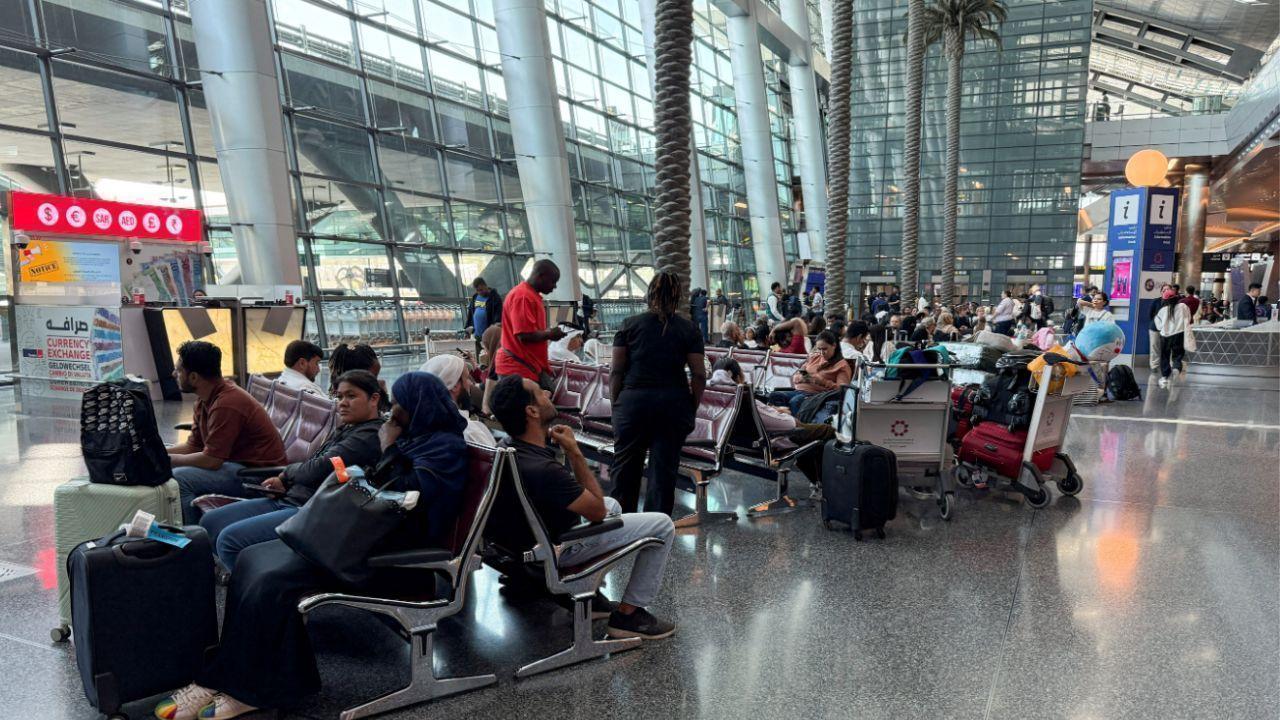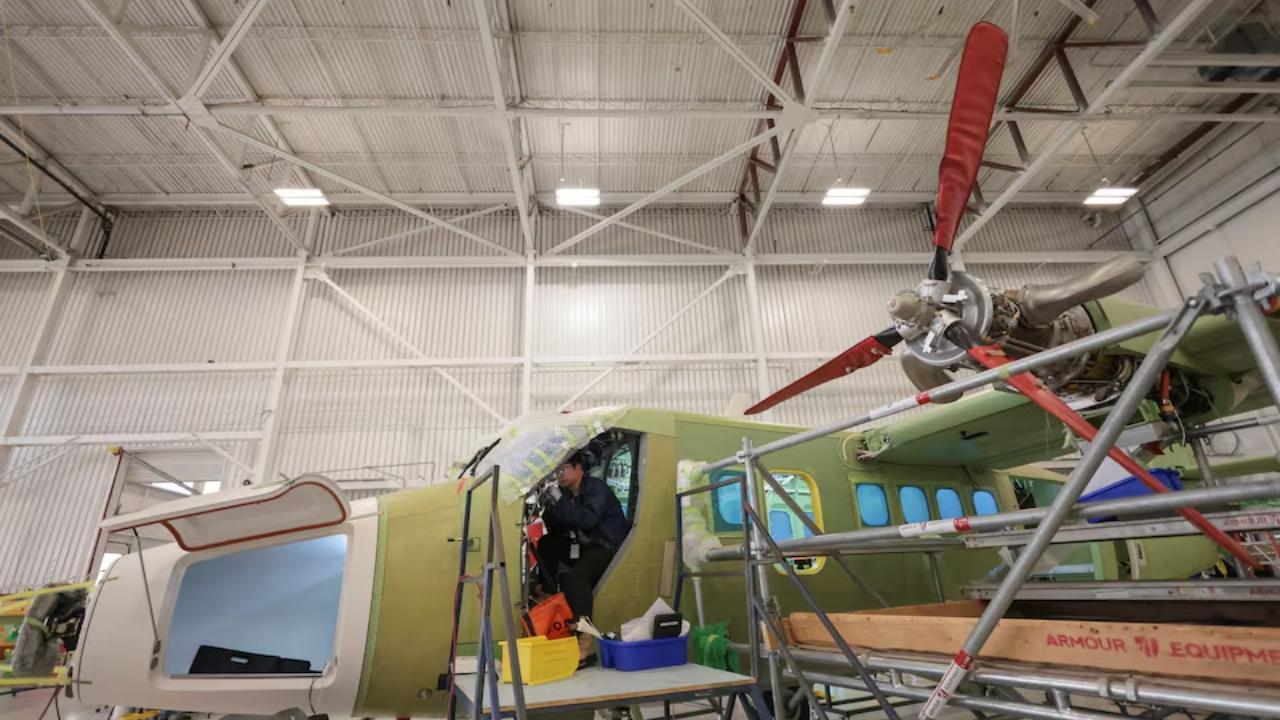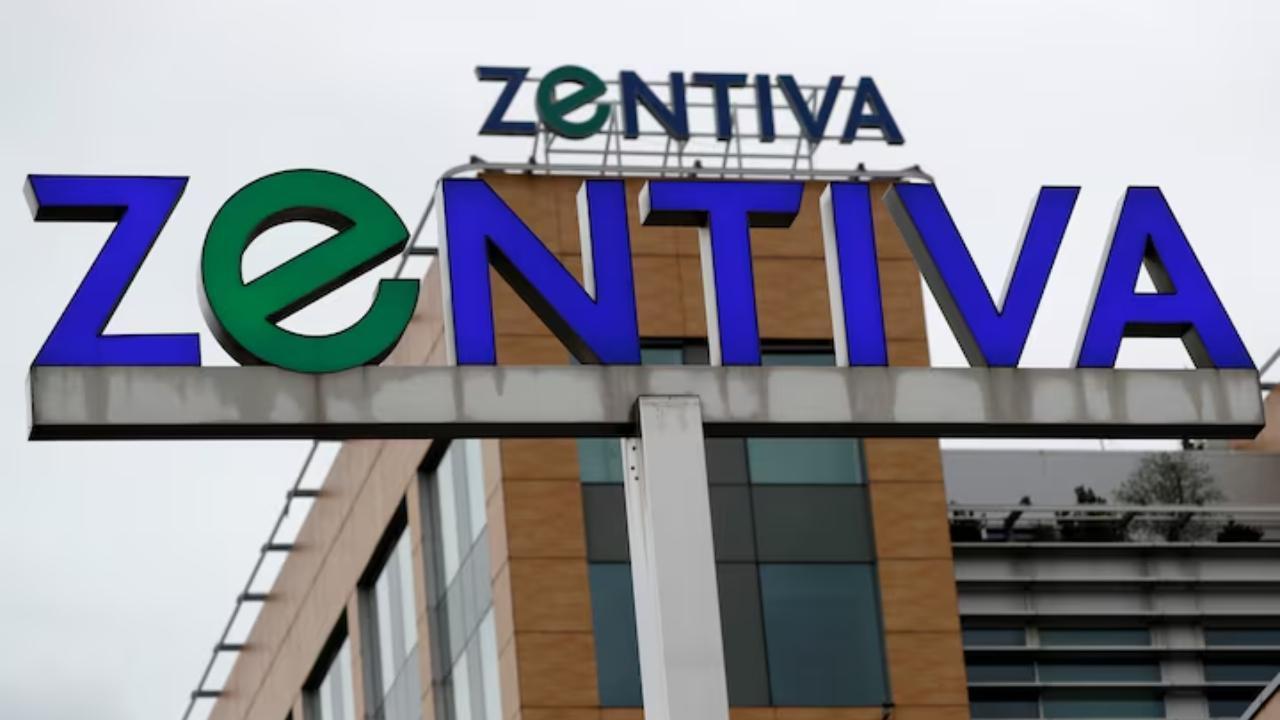
Post by : Priya
Photo:Reuters
Qatar's decision to reopen its airspace marks a significant moment for international aviation, regional diplomacy, and economic recovery. After weeks of suspended routes due to rising tensions in the Middle East, Qatar’s skies are once again open for commercial airlines. This development is more than a routine aviation update — it reflects a broader shift towards peace, cooperation, and logistical normalcy in a region often marked by instability.
Why Qatar Closed Its Airspace
In early June 2025, Qatar, along with several other Gulf nations, temporarily restricted access to its airspace due to escalating regional tensions involving Iran, Israel, and Western powers. Concerns over potential missile strikes, drone activity, and the safety of civilian aircraft prompted these restrictions. Though Qatar remained neutral in the conflict, its geographic location made it vulnerable to nearby military developments.
The temporary closure caused major disruptions for international airlines, especially those flying between Europe and Asia. Flights had to be rerouted through longer and less efficient paths, increasing fuel consumption, travel time, and operating costs.
Qatar’s airspace plays a vital role in global aviation, acting as a central corridor for east-west travel. Its closure was therefore felt across continents.
Immediate Impact of the Closure
The impact of Qatar’s airspace closure was wide-reaching:
Flight Rerouting: Airlines had to make last-minute adjustments to flight plans. Routes over the Gulf region became congested, and detours added hours to travel time.
Passenger Disruption: Thousands of passengers faced delays, missed connections, and cancellations. Some were stranded in transit hubs for days.
Economic Consequences: Airlines faced increased fuel costs. Airports in the region saw reduced traffic. Cargo operations were delayed, affecting supply chains globally.
Aviation Safety Concerns: With some air corridors closed and others overcrowded, safety concerns grew among air traffic controllers and airline unions.
Diplomatic Efforts Behind the Reopening
The reopening of Qatar’s airspace followed intense behind-the-scenes diplomacy. Qatar’s foreign ministry worked with international aviation authorities, the International Civil Aviation Organization (ICAO), neighboring Gulf countries, and key military actors to ensure safety conditions had improved.
The breakthrough came after a quiet yet critical round of talks between Qatar, Iran, and Turkey, along with technical consultations involving the United States and European aviation safety bodies. Once regional security experts confirmed a reduced risk to civilian aircraft, Qatar announced its decision to lift airspace restrictions.
The Qatar Civil Aviation Authority said in a public statement:
“After thorough coordination with regional and global aviation stakeholders, Qatar is pleased to announce the full reopening of its airspace to all international carriers. We remain committed to ensuring safe, secure, and efficient skies for the world.”
How the Reopening Changes the Game
Now that Qatar’s skies are open again, the aviation world is already seeing rapid changes:
Return of Efficient Routes: Airlines can now return to direct paths over Qatar, saving time and reducing emissions.
Financial Recovery for Airlines: With less fuel consumed and shorter routes, airlines are regaining operational stability.
Better Passenger Experience: Travelers will experience shorter flights, fewer delays, and smoother connections through Doha and other Gulf hubs.
Boost to Gulf Aviation Hubs: Hamad International Airport in Doha is expected to regain full traffic capacity. Other airports like Dubai and Abu Dhabi will also benefit from eased regional congestion.
Cargo and Trade Flow Improved: With air freight returning to normal, industries that depend on fast cargo — like pharmaceuticals, electronics, and perishable foods — will see smoother supply chains.
Global Airlines Respond
Several global airlines welcomed the move and began restoring original schedules within hours of the announcement. Qatar Airways, the country’s flagship carrier, resumed full operations through its Doha hub. Other international airlines — such as British Airways, Lufthansa, Singapore Airlines, Turkish Airlines, and Emirates — have already announced their return to pre-closure flight routes.
In a press briefing, Qatar Airways CEO Akbar Al Baker said:
“This is a day of relief not just for Qatar Airways but for the entire aviation community. The reopening of Qatar’s airspace is a step toward global travel recovery and a sign that peace can pave the way for progress.”
What It Means for the Gulf Region
Qatar’s airspace reopening is not just about planes and passengers — it’s about the image and influence of the Gulf region. The decision reflects a willingness to put stability, cooperation, and progress above political or military escalation.
Several regional observers believe this may signal a softening of regional hostilities, especially following recent diplomatic initiatives led by Oman and Turkey. There are also whispers that Qatar could soon host a broader multilateral dialogue on aviation safety and de-escalation, similar to the Gulf Cooperation Council (GCC) talks held during the 2017 blockade crisis.
Qatar’s role as a diplomatic mediator continues to grow, especially as it balances relations with the West, Iran, and its Gulf neighbors.
Impact on Global Travel and Economy
With more than 150,000 planes crossing Middle East skies each month, the effects of airspace closures are felt worldwide. Qatar’s reopening contributes to:
Improved Global Connectivity: Routes between Asia and Europe — particularly to India, Pakistan, and Southeast Asia — are now faster.
Tourism Recovery: Travel to Gulf destinations is expected to rise again as connectivity improves and fears of regional instability ease.
Business Travel and Investment: Investors view open skies as a sign of political and economic stability. The reopening could encourage business travel and commercial deals.
Oil and Gas Exports: Air routes also support cargo flights involved in energy exports — a critical aspect of the Gulf economy.
What Passengers Should Expect
Air travelers booking flights in or through the Middle East should now notice:
Shorter flight durations (by 30 to 90 minutes on average)
Fewer delays and better on-time arrivals
A wider range of flight options from major airlines
Greater availability of seats as flight networks normalize
Passengers flying via Doha’s Hamad International Airport will especially benefit from smoother transfers, as it regains its position as a top global hub.
Challenges Still Remain
While the airspace reopening is a positive step, experts warn that risks in the region have not disappeared entirely. Military tensions between Iran, Israel, and Western forces remain fragile. Any flare-up could once again threaten aviation routes.
International aviation groups have called for:
Skies as a Symbol of Stability
Qatar airspace reopening










New Waterbomber to Fight Growing Wildfires Globally
De Havilland Canada's DHC 515 waterbomber, designed to combat increasing wildfires, has received glo

Bali Floods Claim 14 Lives; Search for Missing Continues
Severe flooding in Bali has resulted in 14 deaths, with two individuals still missing. Over 500 peop

GTCR Acquires Zentiva for $4.8 Billion
GTCR, a private equity firm, has agreed to purchase Czech generic drugmaker Zentiva from Advent Inte

How Chinese Electric Vehicle Technology Is Changing Car Design Worldwide
Chinese EV tech is helping global carmakers make better electric cars faster, but some worry about r

Boeing and Union Agree on Deal to End Strike in St. Louis
Boeing and its workers' union have reached a deal to end a five-week strike in St. Louis, with a new

UniCredit's Influence on Commerzbank: A Year of Change
Italy's UniCredit has pressured Germany's Commerzbank to reform, leading to leadership changes and i